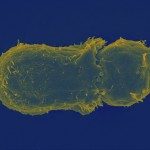Lien vers Pubmed [PMID] – 1972660
Cell. Immunol. 1990 Jul;128(2):578-88
G proteins are membrane-bound molecules involved in coupling of surface receptors with signal transduction effector systems in multiple cell types including T lymphocytes. Given that mature T cells which lack antigen receptors (CDl-Ti) are refractory to stimulation through CD2 or other accessory molecules, T cell receptor components likely play a critical role in coupling surface receptors with signal transduction effectors. It has recently been proposed that modulation of T cell receptor components with MAbs results in a physical loss or functional inactivation of G protein(s). In view of the importance of the T cell activation process, we herein examined G proteins in untreated or antibody-modulated Jurkat T cells as well as in genetic variants lacking either CD3-Ti or CD2 surface receptors. 43- and 41-kDa G protein alpha chains are ADP ribosylated with cholera (CTX) and pertussis (PTX) toxins, respectively, in wild type and receptor minus cell populations. In the wild type Jurkat cell line as well as in CD3- and CD2- variants, AlF4- can activate the G protein(s) presumably associated with phospholipase C to generate polyphosphoinositide turnover as well as an increase in cytoplasmic free calcium ions. Furthermore, G protein(s) linked to adenylylcyclase, a pathway which inhibits T lymphocyte activation, can be directly activated with CTX in the absence of CD3-Ti or CD2 on the membrane. Importantly, AlF4- can also induce polyphosphoinositide turnover in Jurkat cells whose T cell receptor proteins have been modulated with anti-CD3 MAb. These data provide functional and biochemical evidence that at least certain G proteins are intact in the absence of surface expression of CD3-Ti or CD2 molecules and imply that CD3-Ti desensitization is not singularly due to G protein loss.

